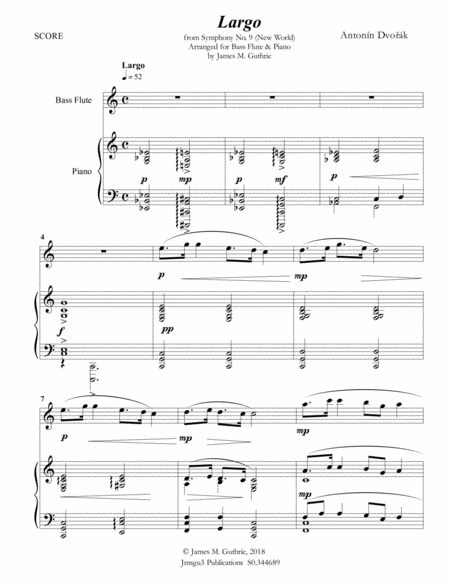Bass Flute,Instrumental Solo,Piano - Level 2 - Digital Download SKU: A0.549430 Composed by Antonin Dvorak. Arranged by James M. Guthrie, ASCAP. Instructional,Romantic Period,Sacred,Standards. Score and individual part. 12 pages. Jmsgu3 #3494193. Published by jmsgu3 (A0.549430). Score: 7 pages, solo part: 2 pages, piano part: 3 pages. Duration: 4:25 Not difficult, but requires sensitivity & dynamic control. Suitable for recitals, church meditations, or school programs. ┬á Dvo┼Ö├ík Background Anton├şn Dvo┼Ö├ík (1841 ÔÇô1904) was, of course, a composer from Czechoslovakia. As a matter of fact, he was among the first Bohemian composers to attain universal recognition. It is important to realize that the late Romantic Nationalist period featured composers who used traditional and folk elements to portray the character of their nation. In particular, we see this in the music of Grieg (Norway), Finland (Sibelius), and Smetana (Bohemia). ┬áDvo┼Ö├ík relied markedly on rhythms and other characteristics of Moravian and Bohemian folk music. Ascent to Fame Dvo┼Ö├ík was truly a child musical prodigy on the violin. The premiere performances of his compositions notably occurred in 1872 and 1873. He submitted his First Symphony in particular to a German competition, but it failed to win. Consequently, in 1874 he presented two more symphonies to the Austrian State Prize for Composition. Johannes Brahms was the principal of the jury and was accordingly very impressed. They forthwith awarded the prize to Dvo┼Ö├ík in 1874, 1876, and 1877. At this point, Brahms thereupon endorsed Dvo┼Ö├ík to the publisher Simrock. Later, the publisher commissioned Dvo┼Ö├ík to compose the Slavonic Dances, Op. 46. These became popular overnight and, as a result, Dvo┼Ö├ík's worldwide status was launched. International Status Dvo┼Ö├ík visited England upon invitation nine times. On each visit, he frequently conducted performances of his own compositions. He conducted concerts of his music, especially in Moscow and St. Petersburg. Eventually, the Prague Conservatory in fact appointed Dvo┼Ö├ík as a professor. There, to be sure, he wrote his famous Dumky Trio. United States Consequently, the National Conservatory of Music of America appointed him as director in 1892. As a result, Dvo┼Ö├ík composed his two most famous symphonic works: the Symphony No. 9 (From the New World), which spread his name universally, and his Concerto for Cello and Orchestra, one of the most famous of all cello works. Moreover, he wrote his most celebrated American String Quartet during this time. At the same time, because of his growing recognition in Europe and his homesickness for his own country, he left to return to Bohemia in 1895.
